H S Vishnoi Solutions for Exercise 2: Review Questions
H S Vishnoi Biology Solutions for Exercise - H S Vishnoi Solutions for Exercise 2: Review Questions
Attempt the practice questions from Exercise 2: Review Questions with hints and solutions to strengthen your understanding. Concise Biology Part-II Class 10 solutions are prepared by Experienced Embibe Experts.
Questions from H S Vishnoi Solutions for Exercise 2: Review Questions with Hints & Solutions
Choose the odd one out in the following set and write the category for the remaining terms:
Cortex, Medulla, Loop of Henle, Hilum
Choose the odd one out in the following set and write the category for the remaining terms:
Glomerulus, Collecting duct, Papilla, Bowman's capsule
Look at the figure given below. It is a section of the human kidney as seen from the front.
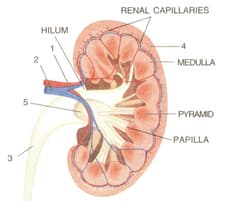
Which area/part (give its name or the number given on the diagram) contains the following:
Malpighian capsule
Look at the figure given below. It is a section of the human kidney as seen from the front.
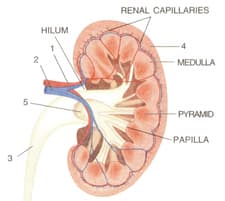
Which area/part (give its name or the number given on the diagram) contains the following respectively:
The blood vessel with least/no nitrogenous waste.
Look at the figure given below. It is a section of the human kidney as seen from the front.
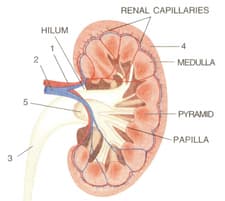
Which area/part (give its name or the number given on the diagram) contains the following:
Freshly collected urine
The following diagram represents a mammalian kidney tubule (nephron) and its blood supply.
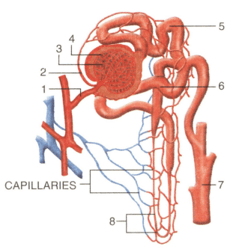
Parts indicated by the guidelines 1 to 8 are as follows :
1. Afferent arteriole from the renal artery;
2. Efferent arteriole
3. Bowman's capsule,
4. Glomerulus;
5. Proximal convoluted tubule with blood capillaries;
6. Distal convoluted tubule with blood capillaries;
7. Collecting tubule;
8. U - shaped loop of Henle.
Study the diagram and answer the questions that follow:
Where is most water reabsorbed?
The following diagram represents a mammalian kidney tubule (nephron) and its blood supply.
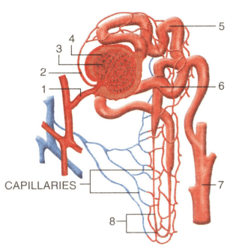
Parts indicated by the guidelines 1 to 8 are as follows :
1. Afferent arteriole from the renal artery;
2. Efferent arteriole
3. Bowman's capsule,
4. Glomerulus;
5. Proximal convoluted tubule with blood capillaries;
6. Distal convoluted tubule with blood capillaries;
7. Collecting tubule;
8. U - shaped loop of Henle.
Study the diagram and answer the questions that follow:
State the reason for the high hydrostatic pressure in the glomerulus.
Study the diagram given alongside and then answer the question that follows:
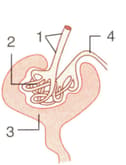
Name the region in the kidney where the above structure is present?
